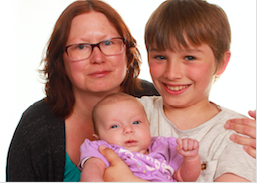We are delighted to publish this guest blog by Dr. Donna Moore from the United Kingdon.
Dr. Moore is a lecturer and research consultant at The Open University. She has been researching perinatal mental illness and internet use for the last 9 years and has presented her findings at several international conferences. Donna’s background is in counselling and she has enjoyed helping many women and their families with perinatal anxiety, not least because she went through it herself with both of her children. Her current work with Dr. Gini Harrison involves researching perinatal anxiety websites and how they may be a useful adjunct to traditional treatment.

Websites for perinatal anxiety – what do women want?
Dr. Donna Moore
Background
1. Perinatal anxiety may affect as many as 1 in 4 women and an increasing number are using the internet for information and support (Glasheen et al., 2010).
2. Websites may be a valuable resource for some women with perinatal mental illness and provide helpful information and support (Moore, Drey, & Ayers, 2017).
3. There is no research to date that investigates the quality and content of websites on perinatal anxiety or what women want from such sites.
The research
I conducted a systematic review of 114 websites for postnatal depression and found that they often had incomplete information with inadequate resources available for women (Moore & Ayers, 2011).
Currently, I am engaged in two research projects with Dr. Gini Harrison. The first is a systematic review of websites for perinatal anxiety and the second is a series of focus groups to understand what women want from these sites.
We have reviewed 50 websites that were dedicated to or had substantial information on perinatal anxiety. Rating scales were developed from the review I did with postnatal depression websites, but we modified the information to reflect content regarding anxiety from DSMV and up-to-date evidence-based research on perinatal anxiety.
Websites were scored for information; this consisted of symptoms, risk factors and the impact the illness has on the mother and child. Scales were also developed to measure the available help for mothers and this had three subsections; tools for mothers (e.g. how to seek help, prevention and tests), mothers support (e.g. telephone, forum and social media support) and additional resources (e.g. links, blogs, and podcasts). Additionally, we scored sites for treatment and screening information, quality of the website itself and how easy it was to read.
We are just in the exciting stage of analysing the data, but we can reveal that preliminary results suggest that, like the postnatal depression review, websites varied greatly in the information and resources they provide. Most websites had incomplete information and scored poorly for available help for mothers.
One interesting and potentially worrying finding is that websites often mix up how they deliver information on anxiety with postnatal depression. This is concerning because women who access these sites may be looking to self-diagnose and/or make the decision if they should consult a healthcare professional.
Information that purports to represent perinatal anxiety but jumbles information with depression symptoms could potentially be confusing for some women. Consequently, they may be led to believe they have nothing wrong with them as their anxious symptoms are not represented.
It is recognised that depression and anxiety can present together, however, it is not always the case. Therefore, some women with anxiety may be failing to seek the treatment they need simply because websites are not accurately portraying perinatal anxiety.
Leading on from the website review, we are conducting several focus groups with women who are pregnant or have a child under 12 months and are experiencing anxiety.
We hope to find out what women want from these websites with a view to developing a website for perinatal anxiety that is all-encompassing providing gold standard information, resources and is top quality. We aim to provide a valuable opportunity for mothers to find out more about anxiety, access online tools to assist self-care and hopefully be encouraged to seek professional help if they need to.
Dr. Moore can be contacted at:
Email: D.Moore@open.ac.uk
Twitter @Moore_Sparkles
To find out more information about her current project using focus groups or to take part please visit:
https://tinyurl.com/perinatalanxiety
Selected publications
Moore, D., Ayers, S., & Drey, N. (2017). The City MISS: Development of a scale to measure stigma of perinatal mental illness. Journal of Reproductive and Infant Psychology, 35(3), doi: 10.1080/02646838.2017.1313967
Moore, D., Drey, N., & Ayers, S. (2017). Use of online forums for perinatal mental illness, stigma and disclosure: an exploratory model. Journal of Medical Internet Research, 4(1): e6. doi:10.2196/mental.5926
Moore, D., Ayers, S., & Drey N. (2016). A thematic analysis of stigma and disclosure for perinatal depression on an online forum. Journal of Medical Internet Research, 3(2): e18. doi:10.2196/mental.5611
Moore, D., & Drey, N. (2015). E-health and e-ethics: Some ethical and practical considerations when conducting Internet research on health forums. Health Psychology Update, 24(1).
Moore, D., & Ayers, S. (2011). A review of postnatal mental health websites: Help for healthcare professionals and patients. Archives of Women’s Mental Health, 443-52. doi: 10.1007/s00737-011-0245-z

